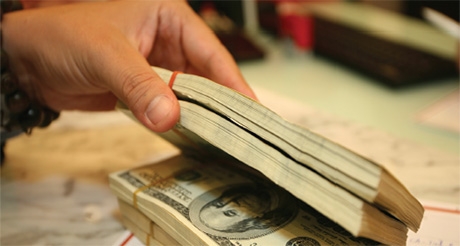Forex flurry turns calm

At the beginning of last week, the exchange rate applied by commercial banks suddenly increased, with Vietcombank’s USD selling price increasing from VND20,970 on March 1 to VND21,020 on March 5, 2013. The exchange rate on the unofficial market was VND21,190 per dollar.
To relieve the growing pressures, the State Bank on March 5 officially reduced the USD price from VND21,036 to VND20,950. The next day, the exchange rate at commercial banks reduced immediately to VND20,970 and stayed at VND20,960 for the end of last week.
Many fingers are now pointing to the fluctuating gold market as a reason for the forex market’s turbulence. Specifically, on March 5 Prime Minister Nguyen Tan Dung signed a decision to allow the State Bank to export/import gold to balance the supply and demand in the domestic market.
Le Hung Dung, chairman of Saigon Jewelry (SJC) – Vietnam’s national gold brand, said the nation needed $1.8-2.4 billion each year to import gold to meet the domestic demand.
Exchange rate fluctuations were also attributed to sentiment that Vietnam should devalue its domestic currency to support exports. Rumours were also blamed for causing fluctuations in the market in recent days.
However, Viet Capital Securities Company last week stated that there should be no worry about the slight devaluation of VND as at the same time “Vietnam has better forex reserves and a trade surplus.”
Vietnam’s exports in the first two months of this year generated $18.97 billion, equal to an on-year increase of 23.9 per cent and imports reached nearly $17.3 billion, a rise of 10.2 per cent, resulting in a trade surplus of $1.67 billion. Foreign direct investment (FDI) disbursement in 2013’s first two months is estimated at $1.05 billion, up 5 per cent over the same period in 2012.
Le Minh Hung, Deputy Governor of the State Bank, said the temporary import for re-export of gold was not responsible for the increased demand for foreign currency.
According to the National Financial Supervisory Committee, the temporary increase in foreign exchange rate was influenced by market sentiment. The real demand for foreign currency was not high, the committee said, predicting that the forex market would soon stabilise.
The committee suggested that Vietnam should not consider adjusting exchange rates, because that would help exports grow significantly but inflationary pressures would also increase.
“However, when controlling inflation becomes more realistic, it is necessary to consider the exchange rate adjustment to relieve pressure on forex market in the medium term.”
What the stars mean:
★ Poor ★ ★ Promising ★★★ Good ★★★★ Very good ★★★★★ Exceptional
 Tag:
Tag:
Related Contents
Latest News
More News
- Cashless payments hit 28 times GDP in 2025 (February 04, 2026 | 18:09)
- SSIAM and DBJ launch Japan Vietnam Capital Fund (February 04, 2026 | 15:57)
- Banks target stronger profits, credit growth in 2026 (February 04, 2026 | 15:43)
- Vietnam on path to investment-grade rating (February 03, 2026 | 13:07)
- Consumer finance sector posts sharp profit growth (February 03, 2026 | 13:05)
- Insurance market building the next chapter of protection (February 02, 2026 | 11:16)
- NAB Innovation Centre underscores Vietnam’s appeal for tech investment (January 30, 2026 | 11:16)
- Vietnam strengthens public debt management with World Bank and IMF (January 30, 2026 | 11:00)
- Corporate bond market poised for stronger growth cycle (January 28, 2026 | 17:13)
- Vietnam's IPO market on recovery trajectory (January 28, 2026 | 17:04)






















 Mobile Version
Mobile Version